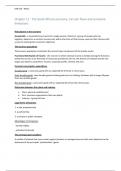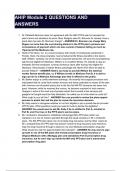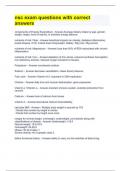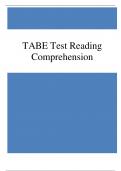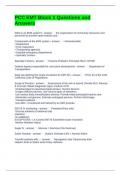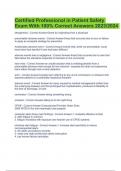EKN 120 - Notes
Chapter 11 - The South African economy, Circular flows and economic
limitations
Role players in the economy
Households - a household may consist of a single person a family or a group of people who live
together, depend on a common income and, within the limits of that income, exercise their choices with
a view to meeting their economic objectives.
The business population
The business population constitutes the second major component of the private sector.
Functional distribution of income - the manner in which national income is divided among the functions
performed to earn it (or the kinds of resources provided to earn it); the division of national income into
wages and salaries, proprietors' income, corporate profits, interest and rent.
Personal consumption expenditure
Durable-good- a consumer good with an expected life of three or more years.
Semi-durable goods- semi durable goods include goods such as clothing, footwear with a longer lifespan
than non-durable goods.
Non-durable good- a consumer good with an expected life of less than three years.
Distinction between firm plant and industry
• Plant- physical establishment
• Firm- business organisations that own plants
• Industry- a group of firms
Legal forms of business
1- a sole proprietorship
2- a partnership
3- a private or public company
Advantages of companies:
- limited liability
- unlimited continuity
The principal-agent problem:
A conflict of interest that occurs when agents (workers or managers) pursue their own objectives to the
detriment of the principals’ (stockholders’) goals.
,EKN 120 - Notes
The government's role:
• Provide legal structure
• Public goods and services
• Private goods (rivalry and excludability)
• Public goods (non-rivalry and non-excludability)
• Quasi-public goods (e.g. education)
• the reallocation process through taxation
role of the foreign sector
• Include all role players
• Open economy
• International trade
Circular flow of the economy
,EKN 120 - Notes
Society's economising problem
Society has a limited or scarce economic resources, meaning all natural, human, and manufactured
resources that go into the production of goods and services.
Resource categories (factors of production):
- Land
- Labour
- Capital
- Entrepreneurial ability
The importance of entrepreneurs:
• Entrepreneurs take the initiative in combining resources to produce a good or service
• Entrepreneurs make the strategic business decisions that set the course of an enterprise
• Entrepreneurs innovate
• Entrepreneurs bear risk
Production possibilities model assumptions:
• Full employment
• Fixed resources
• Fix technology
• two goods
Production possibilities table: Production possibilities graph:
, EKN 120 - Notes
Optimal Allocation of resources (MB = MC):
Chapter 12 – Measuring Domestic Output and National Income
national income accounting - The techniques used to measure the overall production of the economy
and other related variables for the nation as a whole.
Purpose of National Income Accounting:
• Assess the health of the economy by comparing levels of production at regular intervals.
• Track the long-run course of the economy to see whether it has grown, been constant, or
declined.
• Formulate policies that will safeguard and improve the economy’s health.
Gross Domestic Product (GDP) - The total market value of all final goods and services produced in a
given year within the borders of the country (Citizen-supplied or foreign-supplied resources employed
WITHIN the country).
Gross National Income (GNI) - The total market value of all final goods and services produced in a given
year by the residents or registered business from a particular country anywhere in the world.
It is ownership-based and includes also what is earned abroad and repatriated by residents.
Chapter 11 - The South African economy, Circular flows and economic
limitations
Role players in the economy
Households - a household may consist of a single person a family or a group of people who live
together, depend on a common income and, within the limits of that income, exercise their choices with
a view to meeting their economic objectives.
The business population
The business population constitutes the second major component of the private sector.
Functional distribution of income - the manner in which national income is divided among the functions
performed to earn it (or the kinds of resources provided to earn it); the division of national income into
wages and salaries, proprietors' income, corporate profits, interest and rent.
Personal consumption expenditure
Durable-good- a consumer good with an expected life of three or more years.
Semi-durable goods- semi durable goods include goods such as clothing, footwear with a longer lifespan
than non-durable goods.
Non-durable good- a consumer good with an expected life of less than three years.
Distinction between firm plant and industry
• Plant- physical establishment
• Firm- business organisations that own plants
• Industry- a group of firms
Legal forms of business
1- a sole proprietorship
2- a partnership
3- a private or public company
Advantages of companies:
- limited liability
- unlimited continuity
The principal-agent problem:
A conflict of interest that occurs when agents (workers or managers) pursue their own objectives to the
detriment of the principals’ (stockholders’) goals.
,EKN 120 - Notes
The government's role:
• Provide legal structure
• Public goods and services
• Private goods (rivalry and excludability)
• Public goods (non-rivalry and non-excludability)
• Quasi-public goods (e.g. education)
• the reallocation process through taxation
role of the foreign sector
• Include all role players
• Open economy
• International trade
Circular flow of the economy
,EKN 120 - Notes
Society's economising problem
Society has a limited or scarce economic resources, meaning all natural, human, and manufactured
resources that go into the production of goods and services.
Resource categories (factors of production):
- Land
- Labour
- Capital
- Entrepreneurial ability
The importance of entrepreneurs:
• Entrepreneurs take the initiative in combining resources to produce a good or service
• Entrepreneurs make the strategic business decisions that set the course of an enterprise
• Entrepreneurs innovate
• Entrepreneurs bear risk
Production possibilities model assumptions:
• Full employment
• Fixed resources
• Fix technology
• two goods
Production possibilities table: Production possibilities graph:
, EKN 120 - Notes
Optimal Allocation of resources (MB = MC):
Chapter 12 – Measuring Domestic Output and National Income
national income accounting - The techniques used to measure the overall production of the economy
and other related variables for the nation as a whole.
Purpose of National Income Accounting:
• Assess the health of the economy by comparing levels of production at regular intervals.
• Track the long-run course of the economy to see whether it has grown, been constant, or
declined.
• Formulate policies that will safeguard and improve the economy’s health.
Gross Domestic Product (GDP) - The total market value of all final goods and services produced in a
given year within the borders of the country (Citizen-supplied or foreign-supplied resources employed
WITHIN the country).
Gross National Income (GNI) - The total market value of all final goods and services produced in a given
year by the residents or registered business from a particular country anywhere in the world.
It is ownership-based and includes also what is earned abroad and repatriated by residents.

